Last updated on March 7th, 2024
Our site is reader supported, this means we may earn a small commission from Amazon and other affiliates when you buy through links on our site.
As a professional gardener working in my family’s garden centre and running a garden maintenance service for over 20 years, fast-growing climbing plants have been my go-to solution for breathing life into those often overlooked corners of the garden as well as covering up those unsightly structures or simply providing a splash of colour quickly. They are a great alternative to screening ideas, such as the usual bamboo screening, artificial hedging, or even taller plants I sometimes use for screening. The beauty of climbers is that you can pretty much grow them over anything from an old tree trunk to an eyesore of a fence the neighbour won’t agree to replace. Yes, I’ve been there! If you are looking for a manageable evergreen climber to cover a fence I’ve written a separate guide here.
In my guide, I go over some of my favourite fast-growing climbers, the ones I’ve trusted year after year, to cover up those unsightly structures, be it an old shed, a bare garage wall, or a fence, many of which we have also used on our family nursery for the same reasons. Their transformation isn’t just visual; it’s almost magical, turning what was once a bleak spot into a living wall of colours.
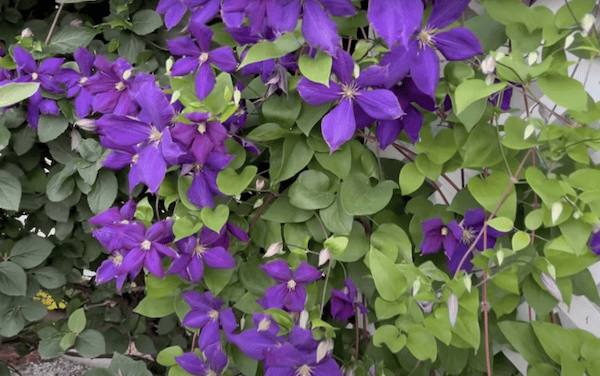
The beauty of climbers lies in their practical versatility; be it a sunny position or a shady corner where a clematis would be perfect, a quick-growing climber will happily grow in the conditions. There are those I call ‘true climbers’, like the self-clinging Clematis Montana, or the somewhat evergreen Passiflora, also known as a Passion flower with its large tropical flowers. These climbers need no introduction to seasoned gardeners – they’re self-sufficient, scaling heights with ease and bringing walls to life with their vibrant blooms and masses of colours.
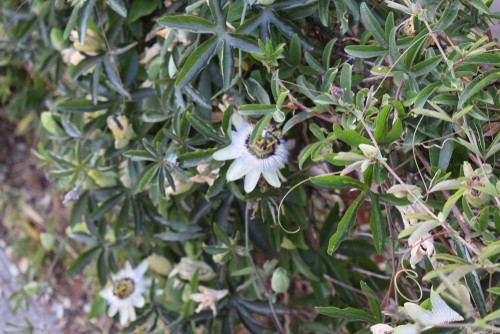
Another option often overlooked is shrubs that can also be trained as climbers; this includes the Euonymus fortunei varieties, including Emerald Gaiety’, which is a great choice.
In my family garden centre, we used these Eyonymus shrubs to add life to raised bed walls. The low maintenance and evergreen nature made them a practical choice for covering walls, and they are low maintenance. They are grown for mainly variegated foliage rather than flowers, but they provide a display of colour all year round.
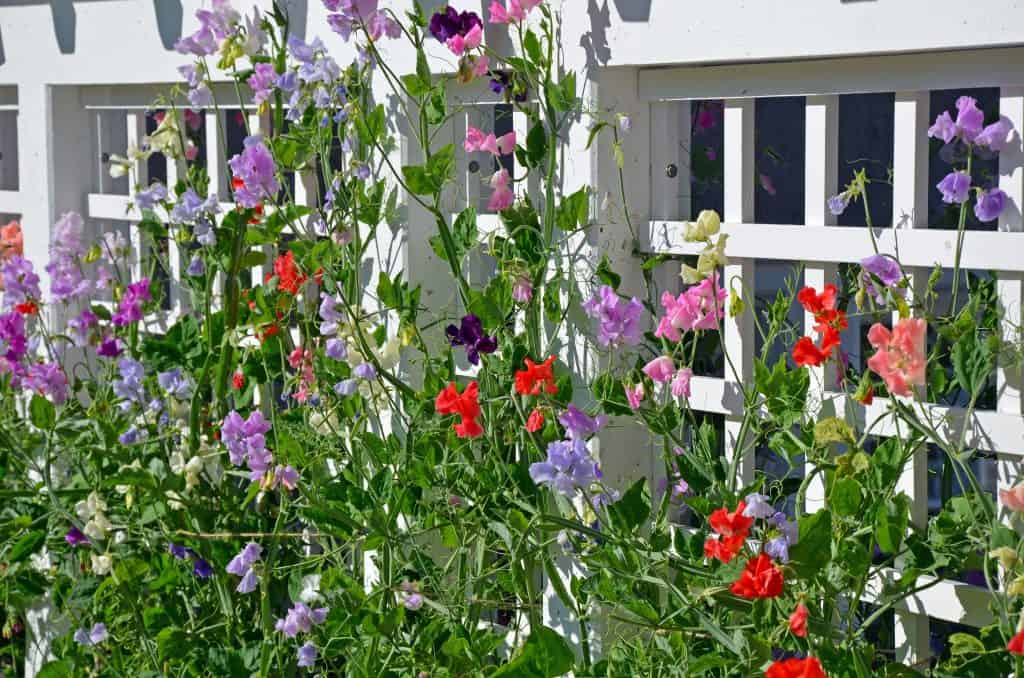
For those who crave a burst of summer colour and don’t mind doing a little more work in the garden, annual climbers like the Black-eyed Susan and the perennial sweet peas are perfect and easy to grow.
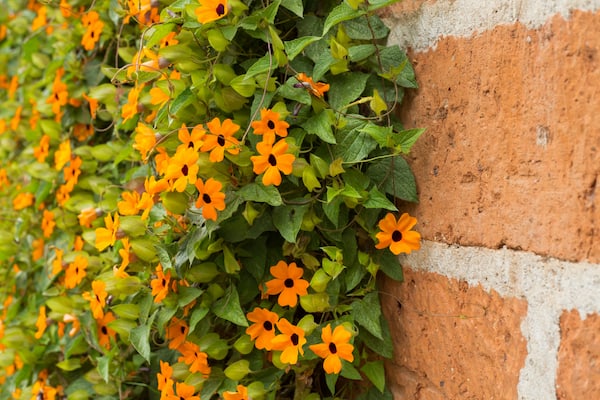
Black-eyed Susan, as well as the annual sweet pea, need replanting each season. They can be overwintered in a greenhouse with a greenhouse heater set to frost-free if that’s your thing. I personally find it easier to grow them every spring from seed, but the reward is a spectacular display of colour that’s easy to achieve, even from seed. It’s worth mentioning that the perennial sweet peas I review below, while less showy, still bring a classic charm to the garden and come back every spring.
Below, you’ll find my carefully selected climbers that not only provide colour but are also ideal for the diverse UK climate. Whether you’re looking to add a splash of colour, cover an unsightly wall, or enjoy the process of gardening, these fast-paced climbers are worth considering, including evergreen climbers as well as deciduous climbers and, of course, those showy annuals and perennial climbers.
Fast Growing Climbers
1. Euonymus fortunei
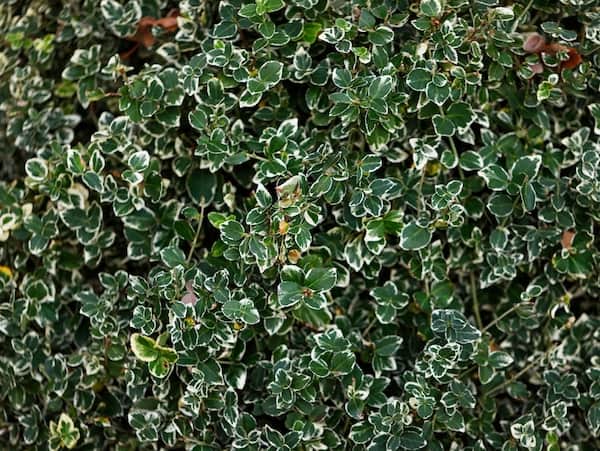
Euonymus fortunei is actually a shrub. However, it can be trained as an evergreen climber, with my two personal varieties being ‘Blondy’ and ‘Emerald Gaiety’. I particularly like it to add year-round colour to vertical spaces where low maintenance is a top factor in my client’s needs. As a professional gardener, I’ve often turned to these resilient shrubs to bring life and colour to walls and fences. What makes them exceptional is their adaptability to be trained as climbers. While not climbers in the traditional sense, their sturdy structure and flexible growth habit allow them to be guided against supports, creating an evergreen tapestry that thrives in both sun and shade. I find that when planted against walls, they develop roots from the stems that attach to the wall, too.
These plants prefer well-drained soil and can tolerate a range of conditions from full sun to partial shade, making them suitable for various garden aspects and even a north-facing wall. To train them as climbers, young plants should be planted close to the wall or fence you wish to cover. As they grow, tie the branches to the support structure, such as a trellis. This can also be done using soft plant ties or twine, ensuring that it does not constrict the growing branches. Over time, ‘Blondy’ with its striking yellow and green leaves and ‘Emerald Gaiety’ with its white-edged foliage will form a dense, leafy coverage, turning a once bland structure into a vibrant green wall.
Regular pruning is essential to maintain the desired shape and encourage thicker growth until established. Pruning is best done in late winter or early spring before the new growth begins. This not only keeps the plants looking tidy but also promotes new, healthy growth, which is vital for maintaining the wall of green throughout the year. With their low maintenance requirements and evergreen nature, Euonymus japonicus adds permanent structure and year-round interest to their vertical spaces.
2. Clematis Montana
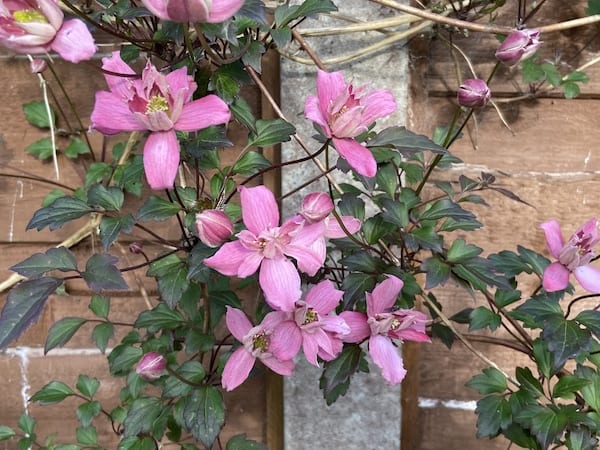
Another fast growing climber that will grow in nearly any position. There are many varieties of Clematis montana, from the montana ‘Grandiflora’ with its pure white flowers to the montana ‘Mayleen’ with its vanilla-scented pink flowers.
This deciduous clematis climbs with its twining leaf stalks, it often flowers around May and produces small, single flowers.
Thrives in sheltered or exposed areas of the garden and full sun or partial shade in most soils types as long as it is well-drained.
3. Clematis armandii
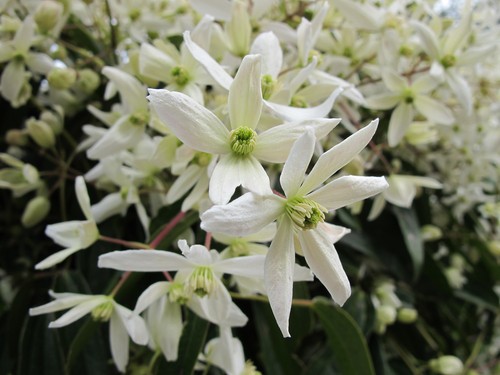
Armandii Clematis as it is also known is a large and vigorous evergreen climber with dark green leathery leaves that are around 15cm across.
They are an early flowering clematis and flower early to mid-spring and have single fragrant creamy white flowers.
They prefer a sheltered position in full sun and will grow to around 8 metres with a spread of around 3 metres.
4. Passiflora (Passion Flower)
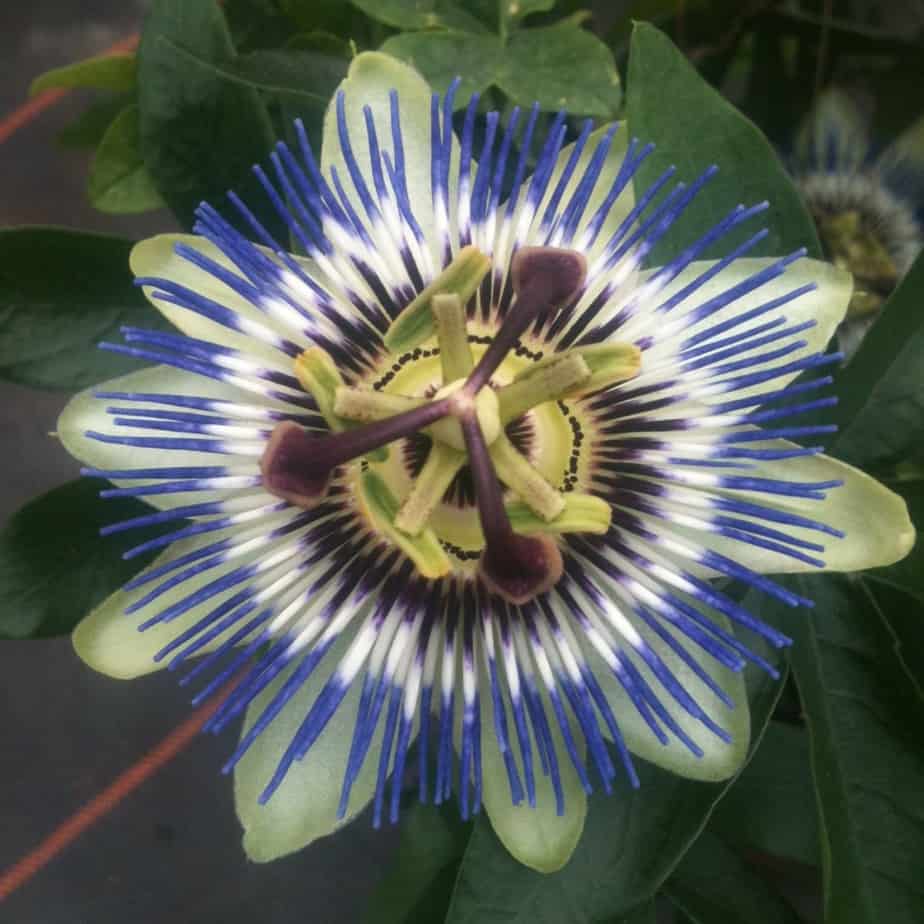
There are many types of Passionflowers, but the hardy variety that is the most common is the ‘caerulea’ variety that produces distinctive and exotic-looking beautiful blue flowers.
They are very fast growing and prefer a sheltered position where they will thrive in full sun or partial shade. They prefer fertile but moist soil and are fairly hardy. In very cold areas they are best grown in large pots and moved indoors in winter.
The large evergreen leaves are lobed and it uses its twining stems to climb. Height x Spread: 12 metres x 4 metres.
5. Lonicera periclymenum (Honeysuckle)
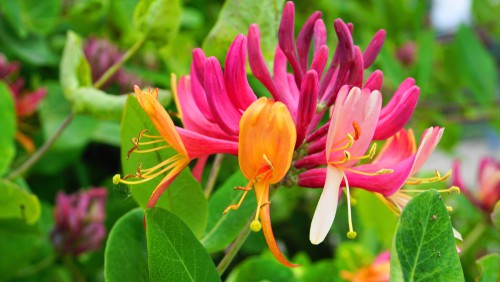
Also known as the ‘Late Dutch Honeysuckle’ there are a few varieties to choose from including ‘Serotina’ and ‘Florida’. These are incredibly fast-growing and are ideal for climbing over pergolas, fences and alternatively up walls, too.
They climb and attach themselves by twining around something, whether it be trellis work or a fence. They are very vigorous deciduous shrubs with oval dark green leaves and produce, often perfumed flowers, in summer and into the autumn, followed by red berries which the birds love.
They grow well in most well-drained soils in full sun and partial shade, so they will grow well on a north-facing wall where they would not receive much sun. What I love is that they can also be placed in exposed or sheltered sites, making them very versatile. A suitable plant for most situations, but they can be affected by a disease known as powdery mildew, so spray with a fungicide at the first sign. They are usually affected less when planted in partial shade. They also require a little pruning to keep them tidy which I have talked more about here
6. Clematis tangutica (Golden Clematis)
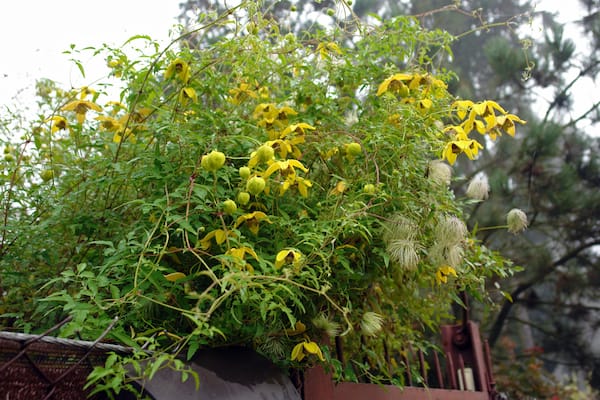
Clematis tangutica, also known as Golden Clematis, is a fast-growing climber renowned for its striking, lantern-shaped yellow flowers and is a popular variety of clematis. This vigorous, deciduous vine can reach an impressive height of around 10 to 15 feet within a single growing season, making it perfect for growing up walls, trellises, or pergolas with its vibrant blooms.
The flowers are followed by silky, feathery seed heads that provide additional visual interest throughout autumn, which is what I love about that. Clematis tangutica is low maintenance, drought-tolerant, and hardy, making it an excellent choice for gardeners seeking a fast and very easy-to-grow climber to add a touch of elegance and colour.
7. Fallopia (Mile-a-minute) – Russian vine
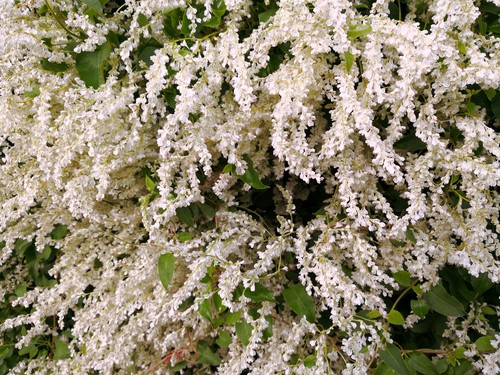
This is probably the fastest-growing of all climbers and is renowned for covering large areas very quickly. In my family’s nursery, this was one of the most popular choices for anyone trying to cover a large eye sore quickly. It’s hardy, fast-growing and easy to grow even in poor soil conditions. Also known as Mile-a-minute and Polygonum baldshuanicum, this deciduous plant has been awarded the Award of Garden Merit (AGM) by The Royal Horticultural Society.
It will grow to an astonishing 13 feet in one year and will grow to approximately 12 metres by 3 metres once fully established, so if you have a large eyesore to cover, this may be the climber for you, as it has been many other gardeners over the years. It has small green leaves that get smothered in creamy white bracts that cover the entire plant.
Grows well in most well-drained soils in full sun or partial shade and is very easy to grow. Very popular, but it can get out of hand in smaller areas.
8. Perennial Sweet Pea (Lathyrus latifolius)
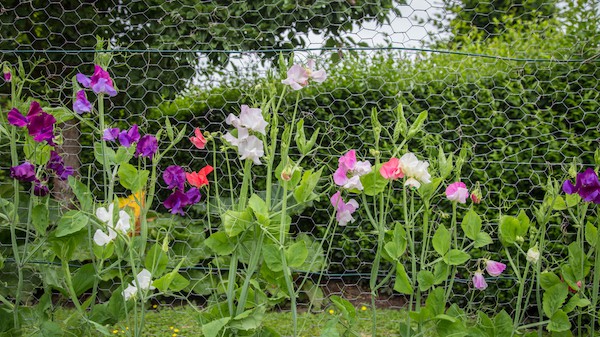
Lathyrus latifolius is actually the perennial Sweet Pea and is a great alternative to the fast-growing annual sweet pea that needs growing from seed every year. This perennial version of the popular sweet peas is a low-maintenance climber which features vibrant clusters of fragrant flowers in shades of pink, white, and purple depending on the variety you choose.
Ideal for covering walls, fences, and trellises, it quickly establishes itself with a strong root system and has an impressive growth rate, reaching heights of 6-9 feet within a single season in good growing conditions. The Perennial Sweet Pea’s resilient nature and hardiness make it perfect for beginner gardeners or those looking for easy-to-grow, high-impact climbers to quickly cover a fence or wall. Just remember, being perennial, it only provides cover from spring into summer and autumn. It still won’t provide any cover in winter.
9. Wisteria ‘Amethyst Falls’
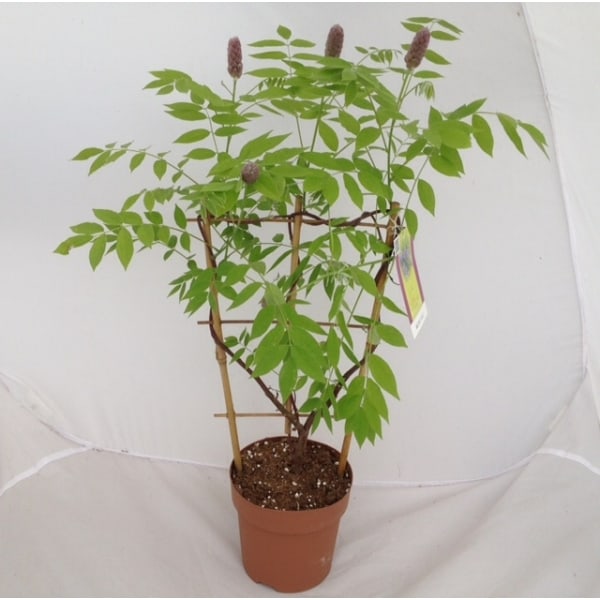
There are many Wisteria cultivars and all are fast growing but the ‘Amethyst Falls‘ has made it onto our list as it is one of the only ones that is fast growing but also suitable for planting in smaller gardens too.
It grows to around 15ft (500cm) with a spread of 10ft (300cm) and needs to be grown on some kind of support, such as a trellis frame or wires.
They are easy to keep to a certain size with the correct pruning method but it also flowers when young and because most Wisterias can take years to flower this is also an added bonus.
It needs full sun but will grow in light shade in fertile well-drained soil.
10. Climbing Roses
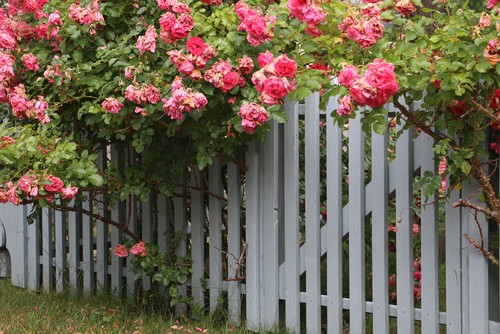
There are many varieties of climbing roses that are fast growing and ideal for growing over a pergola or covering a wall. Some varieties, such as the Zephirine Drouhin, will grow on a shaded, north facing wall. There is no other flower like the ones produced by roses, and their perfumed scents make them extra special.
To read more about the top 10 best climbing roses click here.
11. Parthenocissus quinquefolia (Virginia creeper)
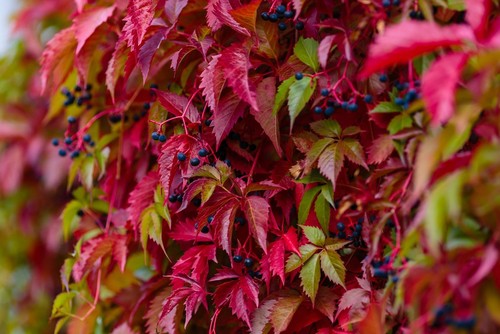
Parthenocissus quinquefolia is also known as the Virginia Creeper plant. It is an excellent all round, deciduous and fast growing climber that will grow in nearly all positions including shade, unlike most climbers.
The green lobed leaves turn red/orange in the autumn for the most beautiful display of colour. They climb by using tendrils or disc-like suckers and because of this, they do not need support as they self cling to walls.
Will grow in sheltered, exposed areas in full sun, partial shade or shade. Plant in fertile but well-drained soil, it grows to around 12 metres tall with a spread of around 8 metres.
12. Climbing Hydrangea
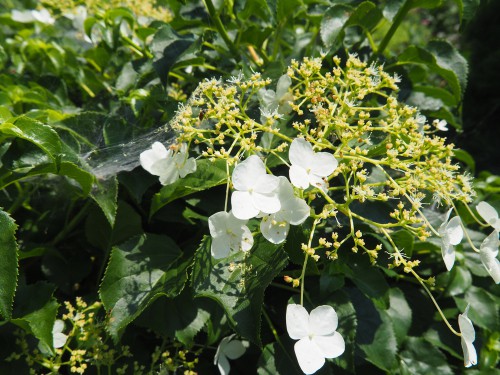
Climbing Hydrangeas are ideal for planting in shadier parts of the garden where nothing else will grow. They use clinging aerial roots to attach themselves to walls and fences and can grow to 50ft once they get going. They flower on the previous years’ growth so pruning straight after flowering is advised.
The lacecap-type flowers are often 30cm (1ft) in length and appear in early summer around May/June. They prefer moist but well-drained soil and shade, partial shade or full sun.
They are a little slow to start so don’t expect too much growth in the first year, however, once they have got their roots out, they will romp away and cover large areas quickly.
13. Humulus lupulus
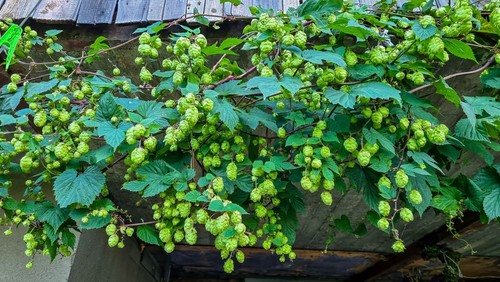
Also known as ‘Golden Hop’, this vigorous twining climber has palmate-lobed yellow leaves followed by small yellow flowers.
Ideally suited for planting in a sheltered position, it grows well in a south-facing or west-facing position in full sun or partial shade.
Prefers moist but well-drained soil and will grow to around 8 metres by 2.5 metres.
14. Nasturtium (Tropaeolum majus)
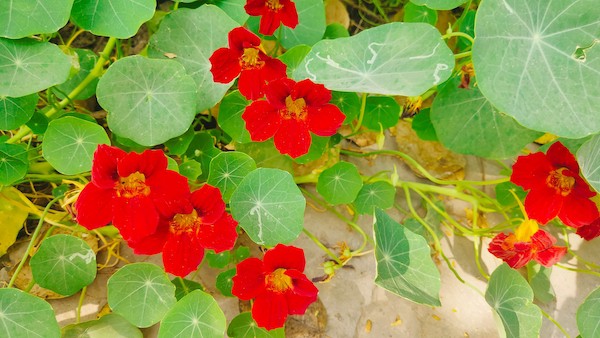
Nasturtiums are colourful and versatile annual climbers that bring a cheerful, exotic touch to any garden over the summer. Renowned for their vibrant, edible flowers in warm shades of yellow, orange, and red, Nasturtiums are fast-growing climbers that can reach up to 10 feet in a single season.
Their lush, round leaves create dense foliage, perfect for covering unsightly walls or fences. Not only do they provide an aesthetic appeal, but they also attract beneficial insects, like pollinators and pest predators, making them fantastic companion plants. With their low-maintenance needs and impressive growth rate, Nasturtiums are an excellent choice for those wanting a quick and easy-to-grow climber for some summer coverage. They are also perfect for growing on a top planted wall and growing over the wall and down.
15. Jasminum Polyanthum
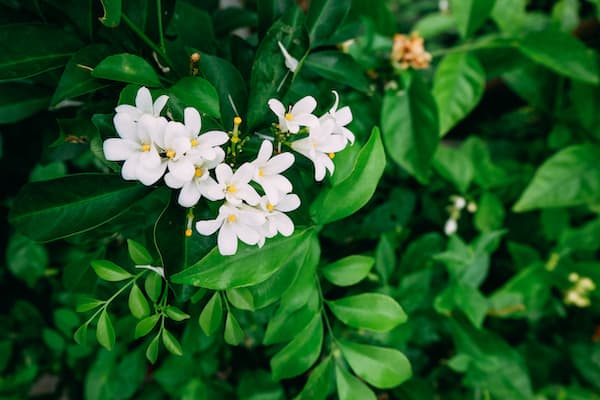
Jasmine, a delightful and enchanting fast-growing climber is a popular choice for anyone looking for a climber with an elegant fragrance and elegant blooms. Jasminum, as it’s botanically known, is a versatile plant that quickly covers fences, walls, trellises, or arbours, providing a verdant and blossoming focal point in your outdoor space.
This captivating climber thrives in well-drained soil and prefers full sun to partial shade. As it swiftly reaches for the sky, jasmine rewards you with an abundance of delicate, star-shaped flowers that not only brighten your garden but also fill the air with a heavenly scent. Easy to care for and adaptable to various climates, jasmine is an excellent choice for gardeners seeking a fast-growing, low-maintenance climber that adds a touch of elegance and a burst of fragrance to their outdoor oasis.
16. Solanum jasminoides Album
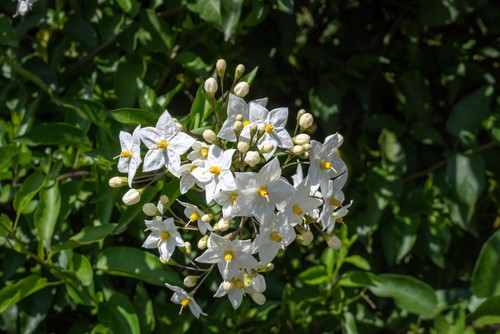
Also known as the Potato Vine, this evergreen climber is best grown against a support or trellis and it will even grow well through other climbers.
Best planted in a sheltered spot in fun sun or semi-shade in fertile but well-drained soil.
Once fully established, they are drought resistant and will grow to around 4 metres by the same spread. The star-shaped white or purple flowers have a mild perfume and will flower from summer and into the autumn. It has been awarded an RHS AGM (Award of Garden Merit).
No products found.
17. Clematis cirrhosa – ‘Freckles’ and ‘Jingle bells’
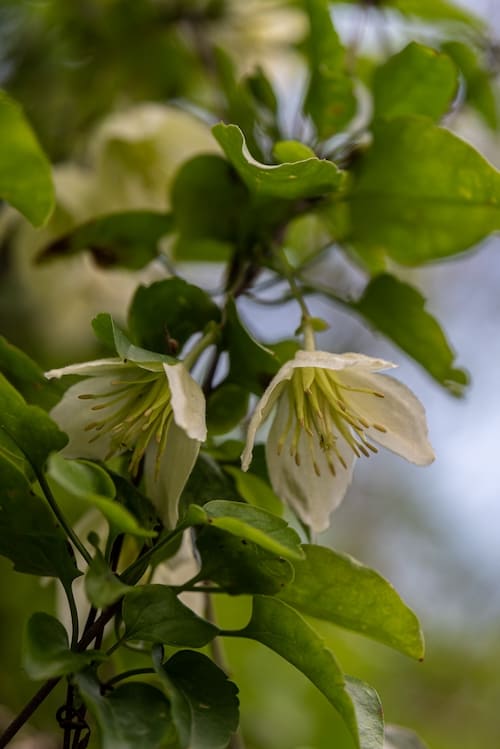
Clematis cirrhosa ‘Freckles’ with its pale pink flowers that are mottled with cream and the ‘Jingle Bells’ variety with its pale yellow flowers are vigorous evergreen climbers that flower in the winter and early spring, making them ideal for providing winter colour. Both prefer a sheltered spot in full sun. They are ideal for a wall side border and for growing in pots.
They get to around 4 metres wide by around a 1 metre spread.
18. Lonicera henryi ‘Copper Beauty’
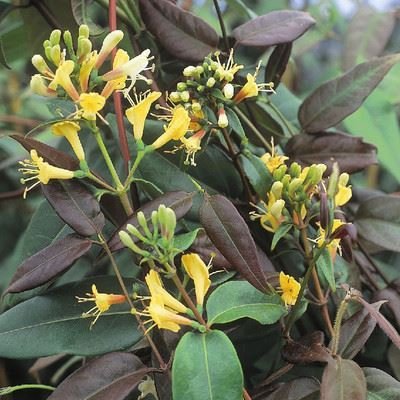
This fast growing evergreen twining climber is often called ‘Henry’s Honeysuckle’. It is a type of honeysuckle and had dark green ovate leaves and produces fragrant yellow and red tubular flowers in summer, these are followed by black berries.
It will grow in most soils as long as it is well-drained and will reach heights of 8 metres. Will grow well in full sun or partial shade and exposed or sheltered areas.
19. Trachelospermum Jasminoides (Star Jasmine)
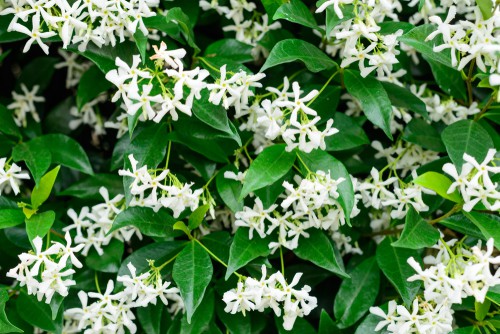
Originating from Japan and the far east, this vigorous evergreen twining climber has dark green ovate leaves and produces jasmine-like star-shaped that are very fragrant white flowers during the summer.
The leaves take on a reddish colour in winter and will grow to approximately 8 metres tall. Plant in fertile, well-drained soil in full sun or partial shade in a sheltered position.
20. Hedera helix (Ivy)

More commonly known as Common Ivy, there are many types of ivy and they are available in a large variety of colours, ranging from dark green leaves to variegated yellow and cream leaves.
They use aerial roots to hold onto walls and will climb anything from walls, fences, trees or whatever they come across. They are very hardy and will grow in full sun or semi-shade and even shade.
With lots of varieties available, there are some smaller varieties so be sure to check out their eventual sizes before purchasing.
Last update on 2025-07-19 / Affiliate links / Images from Amazon Product Advertising API


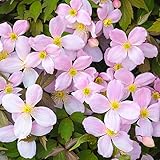



















3 Comments
Many of your growth projections seem very over the top, maybe I am wrong…For example, you say Clematis armandii can grow to 50 feet!!! Every site I’ve been on says 4m (about 16feet max!!!)
Hi Sarah, we have the Clematis Armandii growing to 8 meters which is around 26ft not 50ft. The RHS also state it grows to 8 meters tall. Usually, when you read about plant sizes they are usually height within 10 years, obviously it also depends on the location and how good the soil is ect. Some of the old stately home gardens have some really mature Armandii.
Thanks for a very informative list of fast growing nature.